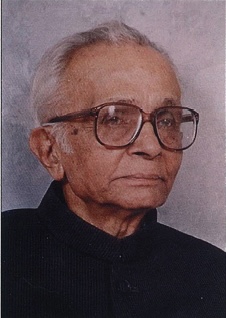By Umananda Quong
R. BANGALORE VENKATA RAMAN, one of the greatest astrologers of the modern era, passed from the earthly stage on Sunday morning, December 20, 1998, at his home in Bangalore, South India. According to Hinduism Today correspondent Choodie Shivaram in Bangalore, he suffered a massive heart attack on Saturday the 19th, and died the next morning. Raman knew his end was near. In early December he gave his student and friend Chakrapani Ullal some of the puja worship implements he’d used his whole life, saying “I won’t be needing these.” His daughter, Gayathri Devi Vasudev, said, “He would keep telling me that his end was nearing, but we did not make it known to others to avoid upsetting our mother.” He is survived by his wife, five sons and two daughters.
B.V. Raman was born in 1912 and devoted his entire life to the revival and propagation of Hindu astrology and traditional Hindu values. Raman became prominent as editor of The Astrological Magazine. Through publications, lectures and organizational work, Raman challenged–and to a great extent reversed–the trend of his countrymen to blindly adopt foreign values and to reject the wisdom of their own ancient traditions, especially astrology. Famed fellow astrologer K.N. Rao called him “The greatest teacher of astrology in the last four hundred years.”
Raman was well versed in many different systems of astrology, but believed firmly that the classical Hindu system was far superior to its counterparts. He therefore sought to propagate knowledge of Hindu astrology wherever there was an interest, anywhere in the world. To this end he travelled and lectured extensively both in India as well as in the Western countries (beginning in 1959), on the subject of Vedic astrology and Hindu culture. He published an entertaining account of his travels, which included his insightful take on the changing America of the 60’s and 70’s as well as amusing details of his travels, such as how he managed to maintain his vegetarian diet–corn flakes being his sole food some days. He met every major astrologer of the West and lectured at the UN.
In 1992, at the age of 80, Raman flew to San Rafael, California, to assist in the formation of the American Council on Vedic Astrology. He supported the fledgling efforts and gave sagely advice for unity, harmony and cooperation among the American astrologers. “Because of him,” stated council member Chakrapani Ullal, arguably America’s foremost astrologer, “we are all astrologers today. He raised the level of astrology and Indian culture to scientific and rational acceptability.”
Raman impressed me with his modest and unassuming behavior, his sense of natural dignity and his vast knowledge of Hindu astrology, culture and religion. Even at his advanced age, he had an extraordinary intellectual capacity and memory.
Although Raman considered himself to be a “conservative Hindu,” he was still broad-minded, catholic, tolerant and respectful of other points of view. His sense of equanimity and detachment concerning personal attacks was matched by the vigor with which he attacked the beliefs of Western-educated, pseudo-scientific skeptics who derided astrology publicly while hypocritically seeking the advice of astrologers in their private lives. He continued to deliver weekly lectures on the importance of astrology up until the last year of his life. Raman was a personal friend and advisor to many politicians and prominent people.
Like most Renaissance Men, Raman had many interests. He was an afficionado and strong advocate of classical dance and music, and a lover of yoga. He earned academic degrees in ayurveda, naturopathy and homeopathy. He played tennis weekly even after 80 years of age. B.V. Raman lived a full and complete life, without the sense of having to compromise his personal values to be successful. Indeed, his success was in a life well lived according to the Sanatana Dharma, and he leaves behind an enduring example of one who successfully tread the path of karma yoga.
ASTROLOGER’S ADVOCATE
In 1936, the young B.V. Raman restarted The Astrological Magazine, begun in 1895 by his grandfather, B.S. Rao. He steered the journal to serious research-oriented pursuit of astrological sciences. He published his own accurate predictions of the major events of World War II, the fate of Hitler and Mussolini, the achievement of Indian independence, the assassination of Mahatma Gandhi, the Chinese invasion of India, Nixon’s election and fall, the Vietnam war and more.
The magazine enjoys a worldwide readership and has been greatly influential in systematically introducing the Hindu sidereal system to Western astrologers, where it has slowly gained many adherents. Each issue contains two or three dozen articles by different authors on subjects as diverse as travel and farm planning to “Hora and Trimsamsa Effects on Rectitude.” India’s elite read it for the political predictions, the rest for its monthly forecasts, according to K.N. Rao.
Raman was a humble and religious man–forgiving and tolerant of his critics and enemies, even to the point of publishing articles in his magazine written by his rivals–articles which personally attacked him for his supposed faults!
ASTROLOGICAL MAGAZINE, RAMAN AND RAJESWARI RESEARCH FOUNDATION, “SRI RAJESWARI,” BANGALORE 560020 INDIA. WWW.INDIAEXPRESS.COM/ASTROLOGY.HTML
